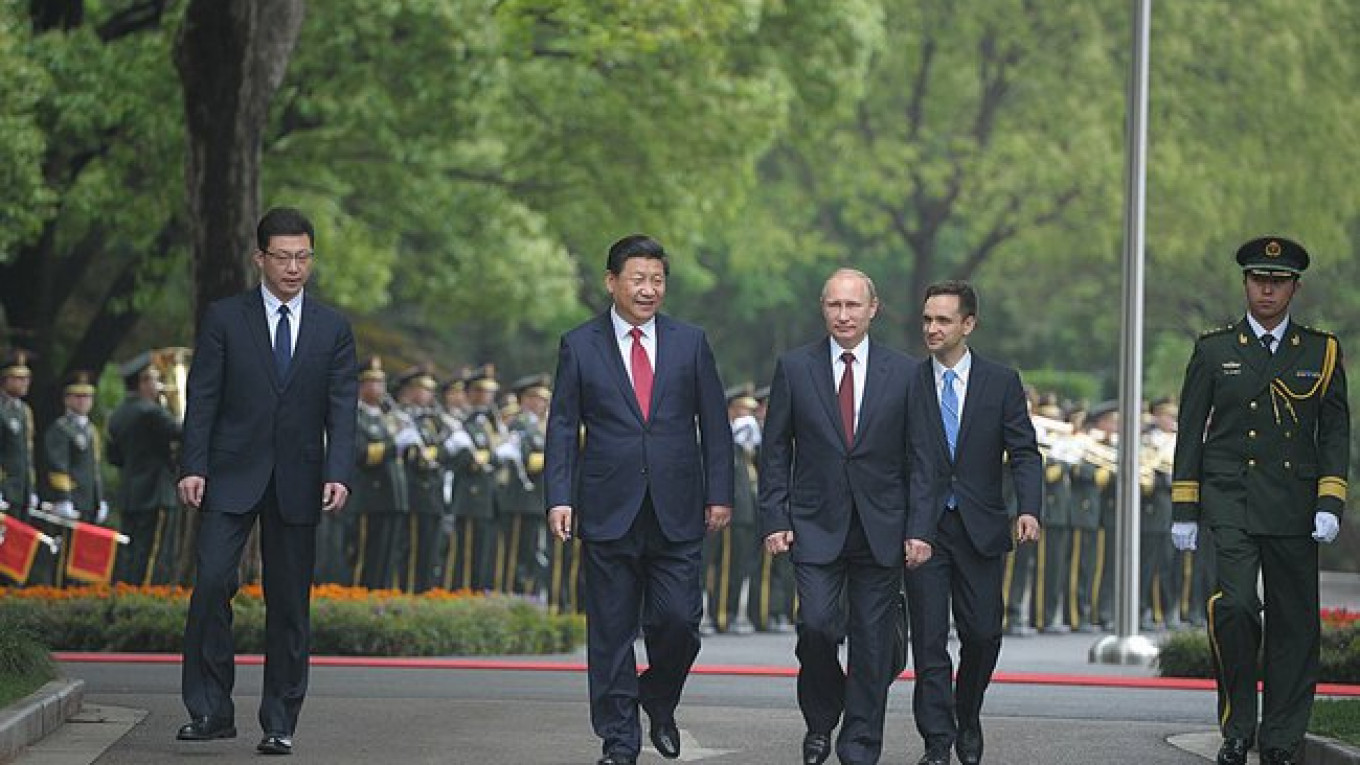Russia's growing focus on Asian relations were thrown into the spotlight Wednesday when state-owned energy giant Gazprom declared that construction of a pipeline to the Pacific will begin as soon as August, thanks to a $25 billion advance on gas payments from Chinese partners.
Gazprom head Alexei Miller announced in a memo Wednesday that the company aims "to weld the first joint of the Power of Siberia pipeline in August," RIA Novosti reported.
Gazprom executives on Wednesday also said that Chinese energy monopoly the China National Petroleum Corporation, or CNPC, has already agreed to pay a $25 billion advance on gas payments, which will go toward financing the pipeline to China, Interfax reported.
Long Overdue
In the wake of tensions with the West following Russia's annexation of Crimea and the ongoing crisis in Ukraine, which the U.S., the European Union and most countries continue to view as a violation of international law, Russia has visibly increased its focus on Asia.
During President Vladimir Putin's visit to China in late May, Miller and his counterpart at CNPC signed a landmark 30-year, $400-billion gas deal that will see Russia deliver 39 billion cubic meters of gas annually to China through the Power of Siberia pipeline, slated for completion within four to six years.
While the pivot east has gained wide attention amid the current political tensions, interest in Asia is nothing new for the Russian government. Even Russia's first president, Boris Yeltsin, was known to personally follow the development of relations with China and would "put pressure" on ministers if he did not see sufficient progress, said Vasily Kashin from the Moscow-based Institute of Far Eastern Studies. In this sense, the crisis in Ukraine has simply added political fire and economic imperative to a long-standing policy.
"The question is not why we are turning to Asia now, the question is what we were doing for many many years, when essentially the policy was entirely Western-centered," Fyodor Lukyanov, head of the Council on Foreign and Defense Policy, a top Russian think tank that advises the government, said earlier this week at a flagship conference of the Association of European Business.
Now it will take years to build the infrastructure needed to pump up trade with Asia, years in which the European Union will be seeking alternatives to dependence on Russian gas. If both sides do commit to this investment, within a decade the total share of Asian countries in Russia's external trade could be equal or even more than that of the EU, Kashin said, with about 35 to 40 percent of Russia's trade going to each.
Asia currently pales as a trading partner for Russia in comparison to the EU. Trade volume with China stands at around $89 billion a year, less than 10 percent of Russia's external trade. The EU, by contrast, is Russia's largest trade partner with a turnover of $410 billion last year.
Cautious With China
Cozying up with China is not without risks, however.
"The danger is that the turn toward Asia will be equivalent to a turn toward China, and in Russia's situation this is without a doubt the most unfavorable outcome, as we would end up in a position of dependence," Lukyanov said.
Throughout the early 1990s and 2000s, the conditions for developing more robust relations with Asia simply were not in place. China's import market grew relatively slowly and the Russian economy couldn't afford the major investments in infrastructure needed to launch major exports of raw material through Siberia and the Far East.
China was active in one sphere: as an export market for Russian arms. China was a major market for Russian weapons in the 1990s, a position later overtaken by India as China developed its own internal arms production.
In the mid-2000s, the prices of raw materials soared, strengthening the Russian economy and providing the funds needed to invest in projects with Asia. Construction of the Eastern Siberia-Pacific Ocean oil pipeline finally began in 2006 and negotiations on gas delivery followed. Nonetheless, despite a decade of negotiating, the two sides failed to reach an agreement until last month.
Similarly, an agreement to build a bridge across the Amur River, signed as early as 1995, has still to be realized. In fact, Russian and Chinese companies signed 40 to 50 contracts a year, but had difficulties carrying them through to fruition, said Andrei Ostrovsky, deputy director of the Far East Institute at the Russian Academy of Sciences.
Kashin agreed that there are risks of over-dependence on China, especially in light of the business conditions within China itself, where state-run monopolies can take control of raw materials markets. To combat this situation, Russia will need to develop relations with other Asian partners. South Korea and Japan offer the most potential as counterweight trading partners, Kashin said. In addition to their avid interest in Russian energy exports, they have the potential to replace the high-technology imports that Russia now receives from Germany and other partners in the EU.
See also:
Russia-China Gas Deal Signed to Applause — and Skepticism
Contact the author at d.damora@imedia.ru
A Message from The Moscow Times:
Dear readers,
We are facing unprecedented challenges. Russia's Prosecutor General's Office has designated The Moscow Times as an "undesirable" organization, criminalizing our work and putting our staff at risk of prosecution. This follows our earlier unjust labeling as a "foreign agent."
These actions are direct attempts to silence independent journalism in Russia. The authorities claim our work "discredits the decisions of the Russian leadership." We see things differently: we strive to provide accurate, unbiased reporting on Russia.
We, the journalists of The Moscow Times, refuse to be silenced. But to continue our work, we need your help.
Your support, no matter how small, makes a world of difference. If you can, please support us monthly starting from just $2. It's quick to set up, and every contribution makes a significant impact.
By supporting The Moscow Times, you're defending open, independent journalism in the face of repression. Thank you for standing with us.
Remind me later.






